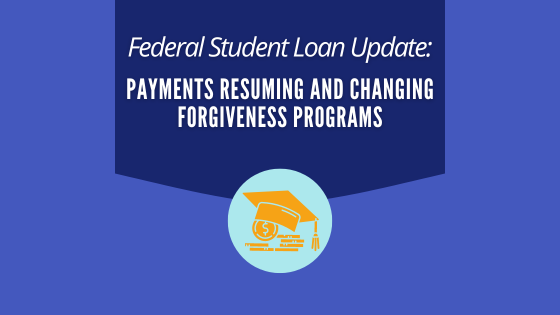Over the past several weeks, major developments have affected the federal student loan landscape. For the first time in over three years, payments and interest accumulation are set to resume this fall, and the U.S. Supreme Court struck down President Biden’s forgiveness proposal.

In early June, the “Fiscal Responsibility Act of 2023” was signed to increase the U.S. debt ceiling. Included in the bill was a clause preventing further extension of the administrative forbearance on federal student loans.
Having started in March 2020 under the Trump administration, the administrative forbearance suspended interest accumulation and all required payments on federal student loans. The debt ceiling bill called for the “termination of suspension of payments on federal student loans [and] resumption of accrual of interest and collections.”
The administrative forbearance is set to end this fall unless a further extension is “expressly authorized by an Act of Congress.” The Department of Education has begun alerting borrowers that interest will resume starting September 1, and payments will be due starting in October.
For some borrowers, the announcement of no further administrative forbearance extensions may fall on deaf ears. There have been several false starts on payments resuming in the past three years.
Borrowers have prepared for payments to start again, only to have the administrative forbearance extended at the last minute. In fact, the original COVID-19 emergency relief measures suspending interest and payments have been extended eight times since being enacted in March 2020.
However, the debt ceiling bill of 2023 feels like the final nail in the administrative forbearance’s coffin. Many borrowers have begun receiving communication from their servicer alerting them to payment being due in October.
According to studentaid.gov, borrowers should receive a bill from their servicer with their payment amount and due date at least 21 days prior to their due date. If you have been assigned a new servicer during the payment pause, you should ensure that you have registered with that new servicer and updated your contact information.
If you are unsure of your servicer, log into the studentaid.gov dashboard to find out.
Borrowers who were making payments before the payment pause should already have an idea of their payment amount. Depending on your repayment plan, the amount could stay the same from March 2020 or be adjusted come October.
Income-Driven Repayment (IDR) Plans are popular among physicians and dentists with federal student loans, especially for borrowers pursuing some type of loan forgiveness program.
As a reminder, the time under the administrative forbearance has counted toward forgiveness programs like IDR Forgiveness and Public Service Loan Forgiveness (PSLF), even if you elected not to make payments during the pause.
Borrowers who were on an Income-Driven Repayment Plan before payments were suspended should expect their monthly payment amount to resume at the same amount as before the administrative forbearance. However, if a borrower recertified their IDR plan since March of 2020, the monthly payments were recalculated based on the new income documentation, and that new payment amount will begin in October.
The Department of Education instructed servicers not to require borrowers to recertify their IDR Plans during the administrative forbearance. One of the only reasons a borrower may have wanted to have their monthly payment recalculated was if they experienced a decrease in their income during the pandemic, which was common among medical professionals with production-based compensation.
Recertifying your Income-Driven Repayment Plan is usually an annual task, and this yearly recertification process is set to resume after repayment begins. According to studentaid.gov, borrowers will have at least six months before they are required to recertify income. Your servicer should reach out to remind you when it is time to submit your income documentation for the annual IDR recalculation.
If you have elected on one of the “Traditional” Repayment Plans, such as the Standard, Graduated, or Extended Repayment Plans, your monthly payment will be recalculated when payments resume based on the principal and interest balance and the number of months remaining in your repayment period.
If you did not make any payments during the administrative forbearance, your monthly payment should resume at the same amount come October.
However, if you did elect to make payments during the administrative forbearance, your Traditional Repayment Plan’s monthly payment should be recalculated at a lower amount than you were paying before March 2020 since you will have a lower outstanding balance when payments are re-amortized in October 2023.
For many borrowers, when repayments begin in October, it will be the first time they have been required to make a federal student loan payment. For this group, it is crucial to begin preparing and planning their student loan strategy.
Borrowers entering repayment for the first time will need to choose a repayment plan. If they do not select a repayment plan, the borrower will be put on the Standard Plan, which follows a 10-year repayment schedule.
More than likely, doctors and dentists entering repayment for the first time are still in training. This group should consider electing an income-driven repayment plan before payments begin in October.
Borrowers can compare repayment plans and apply for an IDR plan and more on the studentaid.gov website.
In August of 2022, President Biden announced a one-time loan forgiveness program for low and middle-income borrowers.
The plan offered up to $10,000 of federal student loan forgiveness for borrowers earning under $125,000 per year individually or married couples making under $250,000. There was also an additional ‘up to $10,000’ of forgiveness for borrowers who hold Pell Grants.
When the application for this one-time forgiveness was live (less than a month), over 26 million borrowers applied. The application was closed in November 2022 after the program started to face a myriad of legal challenges.
The cases challenged the President’s authority to enact such a program and spent months in the lower courts. The case eventually reached the U.S. Supreme Court, and oral arguments were heard earlier this year.
On June 30, 2023, the Supreme Court struck down the Biden Administration’s proposal for one-time federal student debt relief. The justices ruled that the President overstepped his executive authority. The Biden Administration was using the HEROS Act of 2003 as their legal justification for the program.
After the Supreme Court’s ruling, the President said that the “decision has closed one path, [but] now we’re going to pursue another.”
The administration is attempting to still deliver on the campaign promise of student loan relief but will now use the Higher Education Act of 1965 as the legal backing. This is a story to keep an eye on over the coming months.
Other forgiveness programs, such as Public Service Loan Forgiveness and Income-Driven Repayment Forgiveness, have also been in the news recently. This summer, the Department of Education has been working on the One-Time IDR Account Adjustment. This account adjustment is aimed at fixing past pitfalls in the PSLF and IDR forgiveness plans.
During the one-time adjustment, certain payments or months spent on an income-driven repayment plan that previously would not qualify toward forgiveness are now being credited to borrowers’ progress.
The Department of Education is working to review the payment history of every borrower with at least one federal loan held by the department and will be instructing servicers to make the adjustments. These reviews are expected to take into 2024.
Read more on the Department of Education’s actions to fix longstanding failures in the student loan programs.
In response to some of the failures to deliver student loan relief, the Biden Administration announced a new income-driven repayment plan.
Details on The Saving on Valuable Education (SAVE) Plan were released recently. The SAVE Plan will replace the existing Revised Pay as You Earn (REPAYE) Plan. Borrowers on the REPAYE Plan will automatically be switched to the SAVE Plan.
The Department of Education touts that the SAVE Plan will provide nearly all borrowers with the lowest monthly payment of any IDR Plan. However, there are key details that many high earners, like doctors and dentists, will want to know.
For many borrowers who took out loans for graduate school, their graduate school loans make up an overwhelming majority of their federal student loan debt. One of the highlights of the SAVE Plan is reducing the monthly payment calculation from 10% to 5% of discretionary income. However, the 5% is only applied to the portion of a borrower’s loan balance from undergraduate education.
Borrowers with both undergraduate and graduate school loans will pay a weighted average of between 5% and 10% based on the original principal balances of their loans. This change may not benefit doctors and dentists with high graduate school debt.
The other significant change that all borrowers with high or rising incomes, like medical residents, should be aware of is the lack of a “payment cap” under the SAVE Plan. This feature of the current REPAYE Plan will not change with the SAVE Plan.
In the past, many residents or fellows would switch out of the REPAYE Plan once their incomes increased. However, after July 1, 2024, borrowers will not be able to sign up for PAYE. Effectively, new applications to switch to the Pay As You Earn (PAYE) Plan will be closed. Borrowers already on PAYE can remain on PAYE if they are already signed up, meaning that Income-Based Repayment (IBR) will be the only remaining IDR Plan with a payment cap.
For more details on the SAVE Plan, check out studentaid.gov.
This fall will be a major inflection point for borrowers of federal student loans. For many doctors and dentists, student loans are one of their top financial concerns.
The team at Spaugh Dameron Tenny is experienced in helping borrowers navigate the challenges and decisions on how to tackle student loan debt. We will continue to monitor the announcements and student loan forgiveness updates to come.
At SDT, we are here to help you understand how the upcoming changes will affect your situation. Please reach out to your trusted advisor with any questions.
CRN202607-4782696

Will Koster is a financial planner with Spaugh Dameron Tenny. The experience of losing his father as a teenager helped Will find his calling in financial planning. He has a passion for working with dentists and physicians, helping them navigate their unique wealth creation journeys. In addition, Will has become the in-house expert on student loans after completing the Certified Student Loan Professional® training.
There’s no question that the economy is confusing right now. On the one hand, unemployment is low, earnings are up, and our homes are worth more than ...
Read More →Have you worked at a not-for-profit or governmental organization for at least 10 years of your career? Do you still have student loans? Do you know ...
Read More →As inflation has returned, the Federal Reserve has hiked interest rates four times from March 2022 through the end of July 2022. With interest rates ...
Read More →